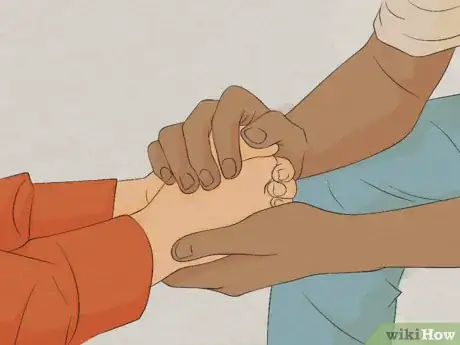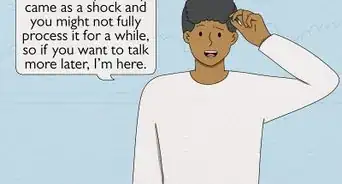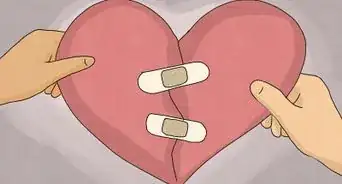This article was co-authored by Amy Chan. Amy Chan is a Relationship Coach and the Founder of Renew Breakup Bootcamp, a retreat that takes a scientific and spiritual approach to healing after the end of a relationship. Her team of psychologists and coaches has helped hundreds of individuals in just five years of operation, and the Bootcamp has been featured on CNN, Vogue, the New York Times, and Fortune. She has published a book on her work, Breakup Bootcamp.
This article has been viewed 81,748 times.
Breaking up is hard to do, and breaking up with someone after a very short relationship can be even harder to navigate. It’s important to think about the break up, make sure the way you break up is respectful, and avoid the sometimes negative after effects.
Steps
Planning the Breakup
-
1Think it over. Even though you have made the decision to break up because it's what's best for you, you should take some time to consider how the other person might feel about the break up. Ending a short-term relationship might come as a shock to the other person, particularly if they think things have been going well. If you plan accordingly, you can minimize this discomfort.[1]
-
2Recognize that it will be hard. There a lot of reasons that breaking up with someone can be hard, even if you haven’t been with them very long. In fact, our brains process breakups very similarly to how they process physical pain. So the phrase “broken heart” is pretty accurate! Even if you are initiating the break up, you will likely feel a variety of emotions: sadness, guilt, regret, and (sometimes) relief. This makes it hard to break up with someone, and recognizing that will help you deal with it.[2]
- Breaking up with someone can actually have a physical effect on your body and lead to decreased energy. Be prepared to take care of yourself by eating well, getting plenty of sleep, and exercising.[3]
Advertisement -
3Consider timing. You shouldn’t stay in a relationship because you feel guilty about causing the other person pain, but you also shouldn’t break up with them the minute you’re sure if the timing is bad.
- Wait a few days after your partner has received bad news – like getting fired from work –to deliver your own news. You should also never break up before or during a date or on someone’s birthday or another holiday.
- The worst time to break up with your current partner is after you’ve already started seeing someone else. If the relationship isn’t working, tell your partner before you start looking for a relationship that does.[4]
Talking to Her
-
1Do it in person. You can use technology – text, social media, or email – to tell your partner you’d like to talk to her, but you generally shouldn't use these communication methods in place of actual conversation. You can try saying something like "Hi Linda! I want to talk to you about something important. When can we talk in person?" Or you could say "I really want to talk to you about our relationship and where it's going. When are you free?"[5]
- Although you should generally avoid using technology to have the actual breakup conversation, this could change depending on the length and nature of your relationship. If a majority of your relationship took place over the phone, or if it feels completely unnatural to talk to her in person about this, then a phone call might suffice (this is particularly true if it is also a long distance relationship). It could save her time as well.
-
2Choose your location wisely. If you’re dreading the in-person conversation you need to have, you might be tempted to choose a very public space to break up. This can make the whole experience more embarrassing and painful for both of you.
- Choose somewhere semi-private. Don’t choose somewhere like a party where she could embarrass herself by crying in front of her (or your!) friends. But do keep in mind that once the conversation is over, you’ll be broken up, so don’t invite her to your place if you live far away from her.
- Avoid places with sentimental value. If you haven’t been in a relationship very long, you probably won’t have many places that have meaning in the context of your relationship. You should still avoid any such places however, like where you had your first date or first kiss.[6]
-
3Be honest and direct. Be up front about why you’re breaking up: maybe you just don’t share a world view or you didn’t realize she was allergic to cats, which you love. Being honest and authentic will make a difficult situation easier.
- Start by saying something positive. For example, you can say "I really enjoyed the time we spent together," or "I think you're a really good person."
- Be clear about what isn't working. You can say, "...but I just don't have time for a serious relationship right now," or "but I'm not having fun anymore" or "but I just feel like it won't work in the long run."
- Clearly state that you want to break up. Say something like "So I want to break up," or "So I want to stay friends but I don't want to be boyfriend and girlfriend." This helps you avoid a situation where she thinks there's a chance to patch things up.
-
4Don't make promises you can't (or won't) keep. If you don't want to be friends after the breakup, don't say you will be. It can be tempting to make such a promise because it can soften the impact, but making a promise and then not keeping it is worse in the long run.[7]
-
5Do not use clichés. Saying “It’s not you, it’s me” doesn’t make anyone feel better and no one believes it. Instead, say something like “I know you want something serious out of our relationship and I’m not ready for that kind of commitment.” Be as straightforward and clear as possible.[8]
-
6Reassure her. Be firm about the break up, but also make sure she knows that you appreciated and enjoyed the time you spent together. Saying something like “I really enjoyed the time we spent together but I just don’t see us working out in the long run” doesn’t leave room for hope that you’ll get back together, but it doesn’t tell her you think she’s a terrible person, either.[9]
-
7Let her react.She might agree with you that the relationship isn’t going anywhere. Or she might cry, ask questions, get angry, or walk away.
- You will know best how to respond, but you might consider holding her hand if she cries or answering her questions as kindly as possible. You can also say something like "I know this hurts you and I'm sorry."
- If, however, she gets more upset rather than calming down, set a specific time to talk to her later and then walk away. Say something like, "I know you're very upset right now, so I will call you tomorrow so we can discuss this when we're both a little more calm." [10]
Avoiding a Negative Experience
-
1Be respectful. Recognize that this is a difficult conversation and might take her by surprise. Don’t resort to name-calling, fighting, or bringing up past mistakes. You want her to think of you as the one who just didn’t work out, not the mean jerk she was glad to get rid of.[11]
-
2Don’t just disappear. It can be tempting to “ghost” a relationship – slowly disappear until your partner realizes it’s over. This is not only immature, it also makes a difficult situation worse by inserting uncertainty into the relationship – you know it’s over, but she doesn’t. Instead, make time to talk to her and clearly end the relationship. It will allow both of you to move on much more quickly.[12]
-
3Don’t drag it out. You shouldn’t drag out a relationship that you know is over by disappearing. You also don’t want to continue to see your partner on a regular basis as if nothing is wrong when you know there is. Once you’ve thought everything through, break up as soon as possible. [13]
References
- ↑ http://kidshealth.org/en/teens/break-up.html#
- ↑ https://www.psychologytoday.com/blog/the-mindful-self-express/201104/the-neuroscience-relationship-breakups
- ↑ Amy Chan. Relationship Coach. Expert Interview. 1 May 2019.
- ↑ http://www.match.com/magazine/article/7597/How-To-Break-Up-With-A-Woman/
- ↑ http://datingtips.match.com/10-ways-break-up-girl-8430475.html
- ↑ http://www.match.com/magazine/article/7597/How-To-Break-Up-With-A-Woman/
- ↑ http://kidshealth.org/en/teens/break-up.html#
- ↑ http://datingtips.match.com/10-ways-break-up-girl-8430475.html
- ↑ http://www.match.com/magazine/article/7597/How-To-Break-Up-With-A-Woman/
Expert Q&A
-
QuestionHow do I move on?
 Amy ChanAmy Chan is a Relationship Coach and the Founder of Renew Breakup Bootcamp, a retreat that takes a scientific and spiritual approach to healing after the end of a relationship. Her team of psychologists and coaches has helped hundreds of individuals in just five years of operation, and the Bootcamp has been featured on CNN, Vogue, the New York Times, and Fortune. She has published a book on her work, Breakup Bootcamp.
Amy ChanAmy Chan is a Relationship Coach and the Founder of Renew Breakup Bootcamp, a retreat that takes a scientific and spiritual approach to healing after the end of a relationship. Her team of psychologists and coaches has helped hundreds of individuals in just five years of operation, and the Bootcamp has been featured on CNN, Vogue, the New York Times, and Fortune. She has published a book on her work, Breakup Bootcamp.
Relationship Coach Breaking up with someone can actually have a physical effect on your body and lead to decreased energy. Be prepared to take care of yourself by eating well, getting plenty of sleep, and exercising.
Breaking up with someone can actually have a physical effect on your body and lead to decreased energy. Be prepared to take care of yourself by eating well, getting plenty of sleep, and exercising.










































































